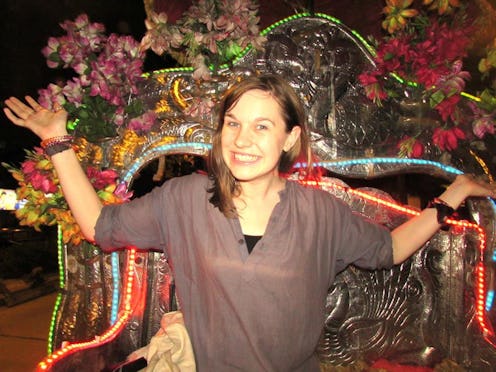Life
Account Of Sexual Harassment In India Goes Viral

Female British travel blogger Lucy Hemmings' account of sexual harassment in India has gone viral in Indian media, with over 500 Indian men contacting her via the Internet to shamefully apologize on behalf of her male harassers. Hemmings' experience with public masturbation on mass transit was obviously horrific, and is an issue faced by countless women who dare to exist in a public space anywhere on the planet. Increasing awareness of sexual harassment and assault is always necessary, and Hemmings was very appreciative of and relieved by their messages. However, men's reactions to her blog have brought up an important question. As stated in an article by The Daily Dot, “Why does a non-native white blogger need to write a blog post about sexual assault” for it to go viral amongst men in the country? The encounter that Hemmings shares (which you can read in its entirety) details a man aggressively masturbating at her at a bus stop:
A few days ago I was sitting in a bus stop in Mumbai, India. The local guy that I had paid no particular attention to moved closer. From the corner of my eye, to my horror, I realised that he had pulled out his penis and was masturbating, staring intently at me. I felt sick.
As much as I hate to admit it, this isn’t the first time it’s happened to me. In fact, chances are, if you’ve ever been to India, you’ll have bumped into at least one traveller who has experienced this sort of behaviour, or heard of someone else who it has happened to.
Hemmings received messages like, “I read your blog about your stay in India, and from the bottom of my heart I apologize on behalf of the men in my country. Just to let you know there are good men in India who are trying everyday to make the country a better place to live in, and of course it is a trail [sic] and error process," and “I felt very bad that you had such a bad experience in India. It is really painful when my fellow Indians behave in such a beastly manner, and end up damaging my beautiful country’s image overseas. But, trust me, not all males in India are like that.” (More responses can be read here.)
Again, Hemmings truly appreciated the messages and the dialogue gave her hope for gender equality. She explained that she feels safe in many parts of India and loves to travel there. She also mentioned defending the country against racist colleagues who view the country as "dirty" or the culture as "wrong."BuzzFeed India published a story about Hemmings' experience months ago, but the story became viral again when ScoopWhoop, a popular Indian website, published a story last week. The problem does not lie in the fact that Hemmings' encounter with a sexually violent man has garnered so much attention; all women's experiences with assault and harassment deserve attention and conversation. However, their focus on Hemmings' foreign nationality in context with the treatment of Indian women creates concern. Again, the Daily Dot writes, " ...this problem isn’t endemic only to foreign visitors to the nation. The fact that it took a white non-Indian female reporting sexual assault to elicit hundreds of responses from Indian men is disturbing, to say the least.” It is reported that a woman is raped in India every 20 minutes. The issue of rape in India gained worldwide attention following the death of a 23-year-old woman after a brutal gang rape on a New Delhi bus in 2012. Two years later, the Hindustan Times reported a survey in which "2,054 women out of the 2,257 (91%) interviewed in Delhi believed the capital had not become any safer since the gang-rape attack. At least 2,189 women (97%) admitted they had faced some form of sexual harassment." A 4-year-old girl died after a rape in 2013.
In March, a 6-year-old girl survived a horrifying rape. Aruna Shanbaug died yesterday after being in a coma caused by brutal rape for 42 years.
These are only four horrific incidents out of countless cases. Where is the viral outcry of men apologizing to Indian women? While there are male anti-rape activists in India, there are also issues with men co-opting women's anti-rape actions, and turning those activist spaces into dangerous situations. This is not meant to invalidate or diminish Hemmings' awful experience in any way, but to explain why people are bothered that Indian men are suddenly rallying around a white woman's sexual abuse in increasingly larger numbers. It also disturbing when considering that light-skinned women are viewed as more beautiful by the Indian media as well, so whiteness is generally viewed as superior.Men need to do a lot more than write blog comments to a British tourist if they want to improve the lives of Indian women. In the meantime, let's remember that the Gulabi Gang, a collective of Indian women wearing pink saris and wielding bamboo sticks, exists and fights back against rapists, and Ram Devineni, a man, has teamed up with rape survivors to create a comic book about a survivor's heroic journey. Image: Lucy'smilesaway - Travel Nonsense Blog/Facebook